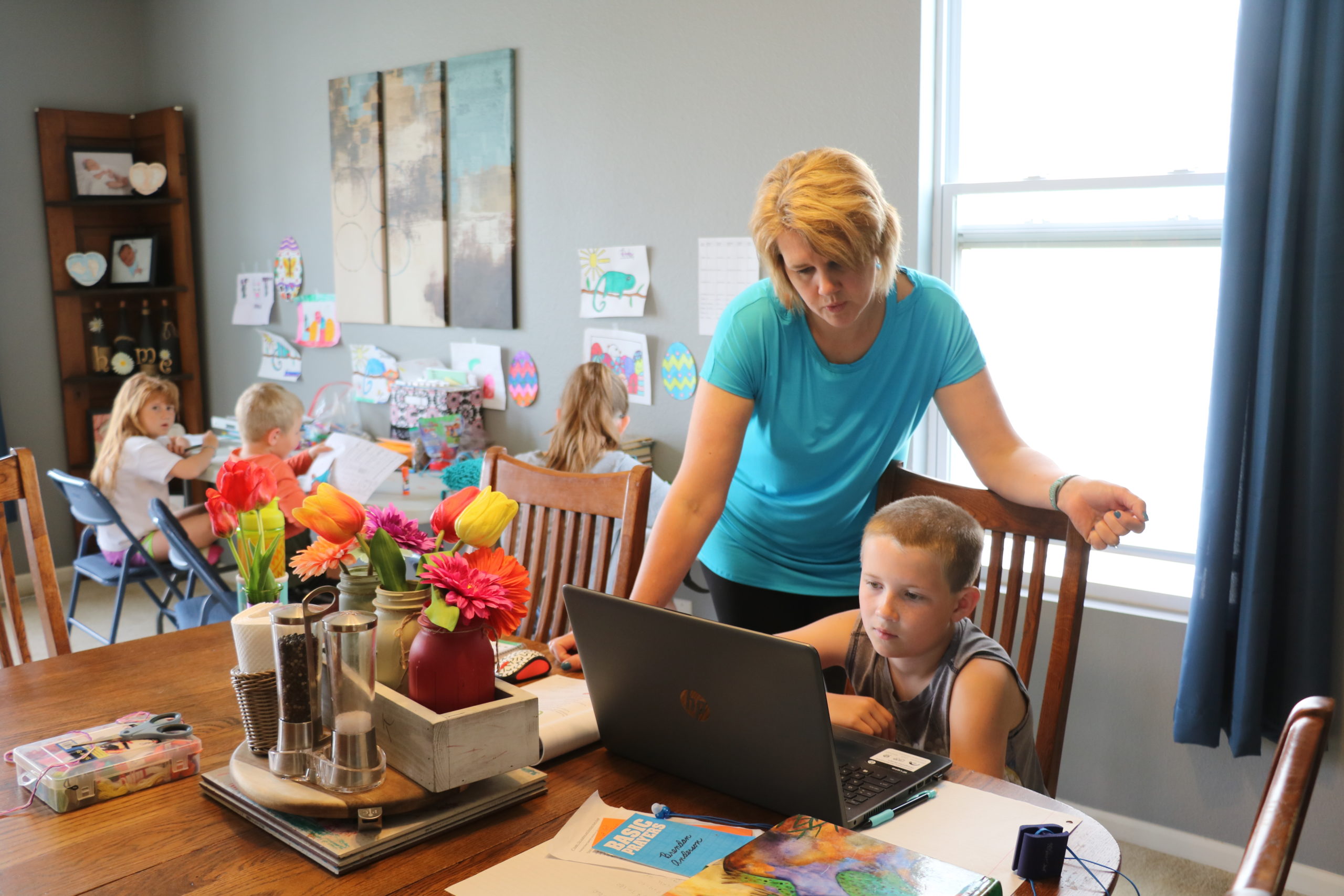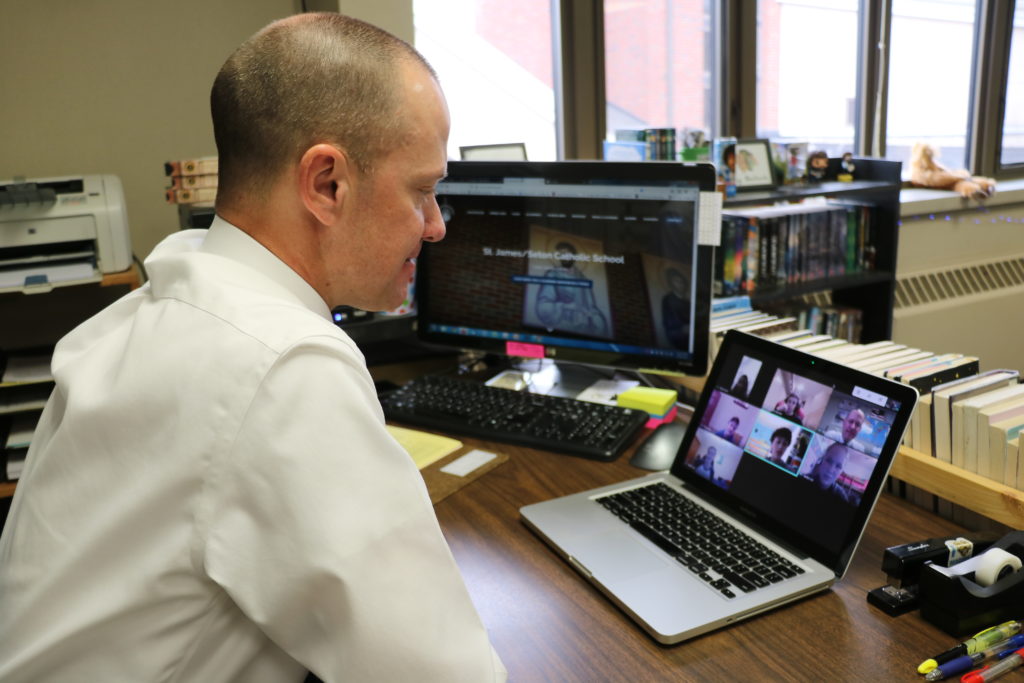
Crystal Anderson reviews an assignment with her son Brendan, a fourth-grader at St. James/Seton School in Omaha, April 25. Home education is part of the family’s new routine as her children and other Catholic school students finish their school year at home under coronavirus restrictions. Other children include, from left, Kynlee, first grade; Easton, pre-kindergarten; and Addison, fifth grade. MIKE MAY/STAFF
News
Home schooling, e-learning boom: Students, teachers, parents rise to meet coronavirus challenge
April 30, 2020
For the Anderson children, it’s out of bed by 8 a.m., breakfast at 8:15, then off to school by 8:30 – their new daily routine.
But in a strange twist, their desks are now only steps from the breakfast table, thanks to the coronavirus pandemic and the closing of all Nebraska schools for the remainder of the 2019-2020 school year.
As Catholic school students, parents, teachers and administrators adapt to state-ordered restrictions keeping students away from the classroom, all parties are quickly learning to navigate the ins and outs of e-learning and meeting the challenges of having students study at home.
The Andersons are no exception. Keeping a routine is the key to success, said Crystal Anderson, who with her family attends St. Elizabeth Ann Church, and whose children go to St. James/Seton School, both in Omaha.
“We’re taking it day by day, and doing what we need to do,” she said. “We try to keep somewhat the same routine as school would be.” Mornings are filled with school work while afternoons allow for outdoor PE activities and games.
Under the new regimen, teachers send students coursework and assignments electronically at the beginning of each week, and parents often oversee their completion. Depending upon the subject, many teachers also conduct one or more live instructional sessions with students, using online resources such as Zoom, Facetime, Google Classroom or Google Meet.
The Andersons’ living room is now a classroom, with workspaces set up for fifth-grader Addison, fourth-grader Brendan, first-grader Kynlee and pre-kindergartner Easton. Mom moves patiently from one to another, helping them understand assignment instructions and checking their work.
And their day begins with a spiritual foundation, Anderson said. Each day, a different child has an opportunity to lead a morning prayer.
They’ve also talked about the coronavirus pandemic as an opportunity for God to “wake people up,” she said. Each day they pray for the safety of the children’s grandparents, who are still working outside their home.
“Addison is a little concerned about them, but we just add them to our prayers every day and ask God to take care of them.”
“We talk about the fact that this is not in our control, this is in God’s control,” Anderson said. “We just need to have faith that he’s going to take care of us, and so far, he has.”
“It’s a new experience for them,” she said. “My oldest had done a little bit of stuff on Google, but not a lot. I think they’re doing OK with it; they seem to like it.”
Fifth-grader Addison said, “I’d rather be at school, but this way is fine.”
Although she misses seeing her friends, they often get to video chat. “But it’s also nice to be around my family for the day,” she said.
For Anderson, who runs her Pampered Chef kitchen products business from her home and works part time as an exercise specialist at Methodist Hospital, essentially becoming a homeschool parent comes with extra demands. They sometimes require the help of her husband Jered, who is working at home for his job at the Cargill livestock feed processing plant in Blair.
“But it’s not as bad as I thought it was going to be,” she said. “The kids are good at it and they know what they’re doing.”

Bob Myer, who teaches eighth grade English and literature classes at St. James/Seton School in Omaha, meets with members of his literature class via computer to review assignment requirements April 25.
MIKE MAY/STAFF
NEW CHALLENGES
Teachers also face a new set of challenges – learning to make greater use of technology, increased planning, and assisting students who need extra help.
As study hall coordinator at V.J. and Angela Skutt Catholic High School in Omaha, it’s Kathy Guinane’s job to help students with learning challenges or who struggle in one way or another in school.
“A lot of them have difficulty with their study skills, with organization and time management, and just being able to advocate for themselves,” Guinane said.
Dealing with technology is not the issue, she said. “It’s feeling that they’re getting bombarded, getting so much – all the Google posts and all the assignments, being able to work through them without the (usual) verbal instruction of teachers.”
So Guinane’s role is to bridge any gaps – to meet individually with students via the internet, often including teachers or school counselors in the conversations.
Like Anderson, Guinane also stresses to students the importance of routines. “I tell them to treat this like real school, that they have to have a routine and a schedule, and a dedicated study space.”
In some ways, Guinane’s daily schedule is even busier due to the demands of educating students remotely.
“When I get up every morning, I go through the Google posts of every teacher of every student I have,” she said. “I see everything across the curriculum – just sorting through what they need to do to make sure they have structure and a schedule.”
MIXED BLESSING
For Breanna Bartak, a senior at Pope John XXIII Central Catholic Junior/Senior High School in Elgin, concluding her high school career at home is a mixed blessing.
“My last semester of high school, it’s kind of strange to be doing it online,” she said.
She misses the many activities that would fill the last couple months of the school year, such as the school musical, prom and graduation. “And it’s sad not being with my friends at school,” said Bartak, one of the school’s 10 seniors, who have been classmates since early elementary school.
But one advantage of online learning is the flexibility it gives her.
“It’s kind of getting me ready for college next year, to start being more responsible and working on my own schedule.” said Bartak, who plans to attend the University of Nebraska at Kearney to study interior design.
Bartak also said her theology class has particularly lent itself to a digital approach.
Father Kevin Vogel, a teacher at Pope John XXIII and St. Boniface Elementary School, also in Elgin, and associate pastor of several parishes in the area, produced and shared videos based on a pilgrimage he made to the Holy Land.
The 40-50 minute videos and short quizzes were presented to the students each day during Holy Week, Bartak said.
“Our first theology video talked about how we really need to start relying on God more and seeing how he’s just testing us right now, and it really makes you think – to count your blessings, and that this isn’t the worst thing that could happen.”
SMOOTH TRANSITION
For students at Pope John XXIII, online platforms like Zoom and Google Classroom were nothing new, so the transition has gone smoothly, said Matt Koeppe, who teaches history, social studies, geography and government for grades 6-12.
But for teachers, one of the biggest challenges is the planning that’s required, he said. “It’s more about looking ahead and focusing more on the (curriculum) standards … more about the broader ideas … and trying to hit those.” It also requires more recording of lessons, he said.
“It’s been nice seeing everyone pull together,” Koeppe said. “We all wish we could be (together) at school, … but I think we’ve done a great job of adapting.”
School administrators are quick to praise both parents and teachers for their efforts to make e-learning work.
Suddenly giving parents the task of monitoring and checking their children’s work was an unanticipated responsibility, said Bill Kelly, St. James/Seton principal.
“They understand this is a challenging situation and they’re making the best of it,” he said.
Incoming Catholic Schools Superintendent Vickie Kauffold said teachers and parents have worked together and communicate well to ensure success.
“Parents have always been the first teachers of our kids, but now they’re doing it in a different way that they haven’t had to do before.”
She also noted the extra work required of teachers, particularly at the beginning of the transition, as they worked to adapt to technology with which some may not have been familiar.
“Our teachers, at every level from kindergarten through high school, they just care so much about their kids,” she said. “It’s for my kids, so I have to just figure it out.”